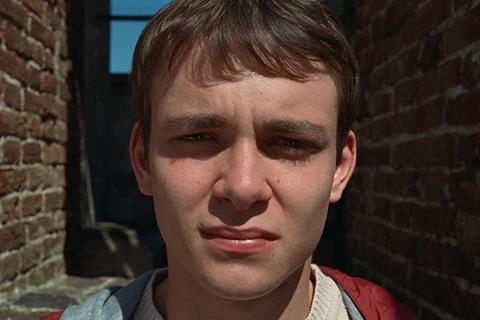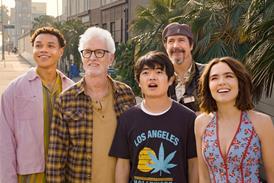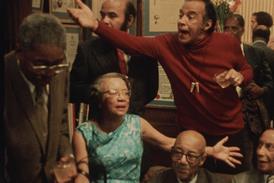Luca Guadagnino produces this limber coming of age debut about a 19-year-old Italian literary student

Dir/scr: Giovanni Tortorici. Italy/UK. 2024. 109mins
“Fourteen- and fifteen-year-olds today are SO different from us,” says 19-year-old Leonardo (Manfredi Marini) to a cousin in Milan. It’s a telling moment in an odd, original film that is deeply embedded in the nineteen-ness of its odd, original protagonist. A few years make a huge difference when you’re that age, and Nineteen is a film that champions difference, letting the individuality of its protagonist – an intense, reclusive, censorious young man who is trying to puzzle out his sexuality and what he cares about – seep into every fold of its quirky fabric.
A formally audacious coming of age story
This is the feature debut of Giovanni Tortorici, an Atlanta-born filmmaker of Italian origin whose CV covers a few shorts, brief theatrical plays and music videos, as well as an assistant director gig on Luca Guadagnino’s We Are Who We Are. After reading the script of Nineteen, Guadagnino stepped up to produce through his Frenesy label. There is certainly an impression here of the kind of artistic freedom, for good and bad, that few first-time directors enjoy. But while Nineteen occasionally feels like a student film – complete with an unhealthy number of jump-cuts and random zooms – it finally reveals itself to be a formally audacious coming of age story which exerts a hold even when Leonardo is spending long hours in his room absorbing the works of obscure 18th century Italian writers or scrolling through Justin Bieber dickpics on his laptop. Having premiered in Venice Horizons, it’s likely to attract festival programmers and arthouse distributors on the lookout for fresh new voices
In his first major role, Marini finds his way tentatively into the character of Leonardo in a way that suits the character well. Opening in the young man’s hometown of Palermo (the various locations are flagged up onscreen in a groovy 1970s font, because why not?), the action soon shifts to London, where Leonardo moves into his older sister’s dingy flat a few days before he is due to start a business studies course. After getting drunk on a night out with her friends, the uncommunicative drifter all of a sudden decides that his real interest is literature – and we’re off to Siena, home of one of the top universities in Italy, for the study of Dante and his fellow scribes. Though there are a couple of golden-hour shots of the historic Tuscan town, we mostly hang out with Leonardo in his dingy student digs.
Deep down, Nineteen is a comedy, with a profound sympathy for its confused protagonist, who is left alone to struggle with identity issues that could so easily turn into mental health issues. But the film stays limber, hopeful and affectionate as it tracks the travails of a mumbling young man trying to find his way in a world of arrogant professors and strong women who either lament his uselessness (at one point, his exasperated mother tells him to “fuck off from the bottom of my heart”) or are turned on by his hunky hesitancy.
Leonardo is a late teenager profoundly embedded in digital culture – but he hates it when his friends and family make grammatical mistakes, and becomes obsessed with the works of a seventeenth-century Jesuit writer and the gruesome Catholic martyrdoms he describes (the film breaks these out out into sequences by two Rome-based artists, illustrator Nora and animator Margherita Giusti). In a quietly hilarious late scene, Leonardo is taken to task in Turin by an art-collector friend of his grandmother, played by leading Italian psychoanalyst Sergio Benvenuto, for his weirdly old-fashioned literary tastes. If ISIS suicide bombers were Italian and studying literature, the gravel-voiced intellectual tells him, they would be into exactly the same obscure authors.
A soundtrack that mixes Baroque classical music with dancefloor anthems mirrors Leonardo’s cultural schizophrenia. Yes, there are times when Nineteen’s DIY style jars – perhaps there’s one unfocused face too many, and the digital photography, with its carefree approach to colour correction, can start to grate. But that’s a small price to pay for such a refreshingly original debut film.
Production company: Frenesy Film Company, Pinball London
International sales: Playtime, info@playtime.group
Producers: Luca Guadagnino, Agustina Costa Varsi, Marco Morabito, Paula Alvarez Vaccaro, Aaron Brookner
Cinematography: Massimiliano Kuveiller
Production design: Marta Morandini
Editing: Marco Costa
Main cast: Manfredi Marini, Vittoria Planeta, Dana Giuliano, Zackari Delmas, Maria Pia Ferlazzo, Sergio Benvenuto, Luca Lazzareschi























